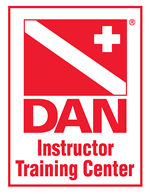FIRST AID AND EMERGENCY COURSES
Scuba diving places us in an environment that we were not born to. Thus, there are a multitude of ways to become injured, when out and about in the diving world. These courses are meant for all divers, and are always part of a diver's path to becoming an accomplished diver, either recreational or professional.

Disclaimer: Course Fees as listed are the basic costs related to: the Instructor & certification. Additional cost(s) depend on the individual student's specific needs.
REACT RIGHT
React Right is SSI's emergency training program, consisting of the following basic components: Primary Assessment, First Aid & CPR Skills, Primary Stabilization Techniques, and includes two optional components: Oxygen Administration in Diving Emergencies and Automated External Defibrilation Basics. Students who complete this program earn the SSI React Right specialty certification.
RM 600

DAN Basic Life Support:
CPR & First Aid
The American Heart Association states that cardiopulmonary resuscitation (CPR) provided by a bystander immediately after sudden cardiac arrest can double or triple a victim's chance of survival. Brain death starts to occur four to six minutes after someone experiences cardiac arrest if no CPR and defibrillation occurs during that time. This course will help prepare you to handle cardiovascular events and other life-threatening incidents. Meets ILCOR/AHA 2015 Guidelines.
RM 450
DAN Neurological Assessment
Stroke is the third-leading cause of death and the leading cause of long-term disability according to the American Heart Association. Decompression illness (DCI) can present as a neurological injury associated with scuba diving. Rapid recognition of and response to a suspected neurological injury, regardless of cause, can help convince
the injured person of the need for emergency oxygen and help the responder monitor the injured person's condition and report findings to emergency medical services (EMS).


RM 450
DAN Emergency Oxygen
for Scuba Diving Injuries
When a diving accident occurs, being able to recognize the problem and respond with the appropriate care can speed the diver's recovery and minimize lasting effects. Oxygen first aid provides needed oxygen to body tissues, enhances the elimination of inert gases such as nitrogen obtained from breathing gases, and helps shrink any gas bubbles that may have developed during ascent — bubbles that contribute to decompression sickness and arterial gas embolism. Supplemental oxygen also can help minimize or eliminate existing symptoms and reduce further injury until medical services are engaged.
RM 450
DAN First Aid for
Hazardous Marine Life Injuries
Divers may experience unintentional encounters with fire coral, jellyfish and other marine creatures. Any time a person enters the marine environment there is a chance of being stung, bitten or cut. This course will teach you where you can expect to encounter potentially hazardous marine life and how to provide first aid when injuries occur. The more you know about the marine environment, the greater your chances of having safe, memorable dives.


RM 450
DAN DEMP
Diving Emergency
Management Provider
The DEMP program prepares you to address multiple problems at once and with confidence. It combines the knowledge and skills from the following four courses into a single approach to managing diving emergencies: Basic Life Support: CPR and First Aid, Neurological Assessment, Emergency Oxygen for Scuba Diving Injuries and First Aid for Hazardous Marine Life Injuries.
RM 1150

DAN DFA-PRO
Diving First Aid
for Professional Divers
The Diving First Aid for Professional Divers (DFA Pro) course is aimed at commercial, professional, scientific divers and aquarium staff and volunteers and meets the 2010 Guidelines for Resuscitation & OSHA.
The course is comprised of information from the Emergency Oxygen for Scuba Diving Injuries, Neurological Assessment, First Aid for Hazardous Marine Life Injuries and CPR HCP plus Bloodborne pathogens.
RM 1350



.png)

